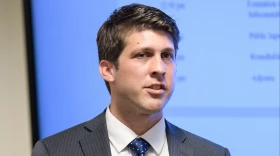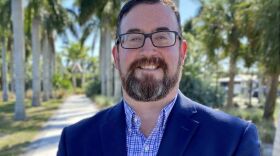Governor Ron DeSantis signed SB 102, called by its sponsor the Live Local Act. It allocates $711 million for housing projects through the Florida Housing and Finance Corporation (FHFC) with DeSantis describing it as the largest investment in housing ever in state history.
The House voted 103-6 last week to pass Senate President Katheleen Passidomo's bill, which nearly doubles the 2022-2023 investment.
LeadingAge Florida is an association that represents the entire continuum of care for older adults in Florida. Director of Communications Nick Van Der Linden said the organization has been working with Passidomo and Senator Alexis Calatayud to bring awareness to the need for senior housing.
“While this bill is somewhat limited in provisions that specifically place an emphasis on elderly housing, there are still a lot of great benefits and just elderly people in general being served by it or that are already living in housing that this legislation focuses on,” Van Der Linden said.
He specifically pointed to policies on housing production and rehab programs that encourage self-sufficiency of unique populations, which includes older Floridians.
Van Der Linden said those who work in the affordable housing field often meet people who are being priced out of their homes.
“More than half of the older adults that they interact with that experience homelessness, were never homeless before the age of 50,” Van Der Linden said. “These are not people that have been homeless for their entire life. They had jobs, they were lawyers, they were nurses, or they had careers, but may have just come into some unfortunate or unforeseen circumstances and have lost all of their [life savings]. So now they're considered extremely low income and are at an older age, making it difficult to just kind of start over.”
People can be on waiting lists for affordable housing all over Florida for up to five years.
“There are times that spots open, not just because people move out of these apartments, but that's because they pass away,” Van Der Linden said. “They pass away while they're on the waiting list, it's just that long, the demand is so high for it.”
Christine Harris is a realtor with Sellstate Priority Realty. She said she has clients who can’t afford Southwest Florida’s current housing costs.
Harris said she is working right now with a client who has a well-paying job and is looking to buy a condo.
“She wanted a house, but she can't afford a house,” Harris said. "The interest rates are so high right now.”
Her client can afford the interest rates of the $225,000 condo she’s interested in, but her mortgage payments are too expensive.
“Her mortgage on that was going to be $2,000 a month with the HOAs, so that's a lot of money, even if you do make good money,” Harris said. “So, she’s stuck renting until she can either come up with more money down or we can find something that's within her budget.”
Harris said that three years ago, that $2,000 mortgage payment would’ve been $1,300 a month. She said most people would need to have a roommate to afford the high rent prices.
“The problem with being stuck renting in a regular renting condo, is the rents increasing and it's not only increasing like a couple hundred dollars. I mean, I'm hearing people saying theirs went up $500, $600,” Harris said.
Some Floridians are not pleased with the new law. Drew Broderick of Fort Myers took to Facebook to spell out his disappointment with the measure. Broderick claimed the law gives tenants more rights than owners of rental properties.
"It’s no longer an investment to own rental property in Florida," Broderick wrote. "So the supply will decrease, and the prices will rise. To fix the affordable housing crisis in Florida and nationwide you need to first legalize affordable housing options that have been unconstitutionally outlawed in every city, in every state, so the private sector and the free market can do its job and solve this crisis."
Broderick wrote that despite the new law, local regulations and ordinances will work against owners getting a fair shake, and providing less expensive rentals.
"Minimum wage workers could afford rent without tax payer subsidies, but all those ways are outlawed by local leaders through zoning, codes, regulations, fees and taxes," Broderick claimed.
Gov. DeSantis highlighted what he and the bill sponsors have called the major impacts of the Live Local Act.
This story was produced by FGCU Journalism's Democracy Watch course. Hayley Lemery can be reached at hklemery9681@eagle.fgcu.edu.




